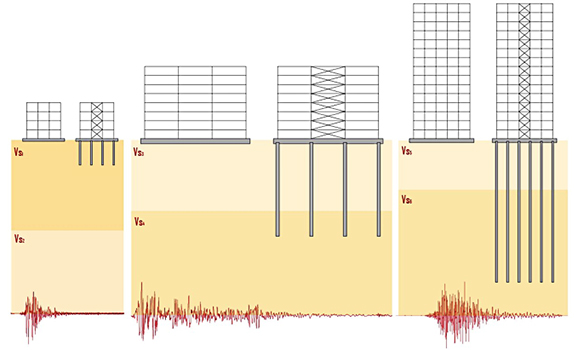Title of Project:
SSI-STEEL: Soil-Structures Interaction effects for STEEL structures
Hosting Research Infrastructure:
University of Bristol
No. of Users:
9
Team Leader:
University of Patras
Theodore L. Karavasilis
Team:
University “G. d’Annunzio” of Chieti
Giuseppe Brando
University “G. d’Annunzio” of Chieti
Alessandro Pagliaroli
University of Surrey
Subhamoy Bhattacharya
Technical University of Madrid
Amadeo Benavent-Climent
University of Las Palmas de Gran Canaria
Luis Alberto Padrón Hernández
University of Greenwich
Panos Kloukinas
ASDEA Software Start Up Innovativa s.r.l.
Guido Camata
SARA electronic instruments s.r.l.
Mauro Mariotti
Summary of Project:
The research project aims at investigating the behaviour of steel structures founded on different types of soil, with the final goal of evaluating the Soil-Structure Interaction (SSI) influence on the overall system response, in terms of stresses, displacements, failure modes/mechanisms, etc.
To this purpose, shake table tests will be carried out at the EQUALS Laboratory of the University of Bristol on scaled models founded on both rigid and flexible soil conditions. These tests will be executed under selected records that, considering predetermined soil-structure relative stiffnesses, will allow to emphatize the SSI effects. Then the experimental outcomes will be considered for validating numerical FE models that will be used in order to carry out parametric analyses. These parametric analyses will be addressed to the revision of the design parameters currently proposed by Codes and Guidelines. For example, the behaviour factors given for the most conventional structural types, in order to carry out linear analyses taking into account the structural ductility and dissipative resources, will be revised.
Four structural types will be dealt with in the project. Two of them are Concentrically Braces Frames (CBF) and Moment Resisting (MRF) Frames, which, although they are largely dealt with in the current European Codes, nonetheless, they are usually designed according to rules and formulations that have been indicated based on studies and researches of the past carried out under the assumption of rigid soil.
Also, a Dual Steel Frame (DSF) with new brace-type hybrid dampers will be taken into account. The new damper consists on tube-in-tube assemblage of two commonly available hollow structural sections with a central bar made of Shape Memory Alloys (SMA) material (NiTi).
Finally, the seismic response of offshore wind turbines (OWT) taking SSI into account will be dealt with considering different types of superstructures and foundations.


